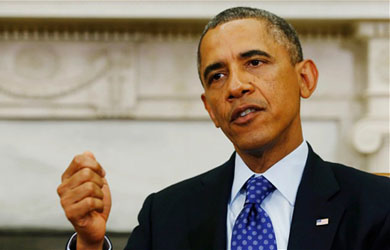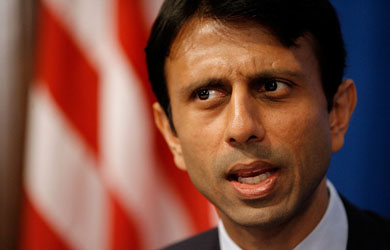Fox News pundit Todd Starnes made waves last year when he claimed that the Air Force was preparing to “court martial” Christians as part of an Obama administration “religious cleansing of the military.”
As it turned out, the policy on proselytizing that Starnes cited to make these claims [PDF] was crafted in 2008 – during the Bush administration – and in no way calls for the court martialing of Christians.
The regulations do stress that “leaders at all levels” should “avoid the actual or apparent use of their position to promote their personal religious beliefs to their subordinates or to extend preferential treatment for any religion. Commanders or supervisors who engage in such behavior may cause members to doubt their impartiality and objectivity. The potential result is a degradation of the unit’s morale, good order, and discipline.”
But the facts didn’t stop Republicans politicians and conservative activists from using the Bush-era policy to attack President Obama and to push for looser restrictions on religious proselytizing in the military.
And now, the Religious Right’s campaign may be succeeding in pressuring the Air Force to water down the 2008 policy. McClatchy reports today that while Air Force officials maintain that the accusations of religious persecution in the military aren’t true, they are considering altering the rules on religious coercion in response to pressure from the Right.
The Air Force reportedly convened a meeting to discuss the policy in March, and the Family Research Council’s Tony Perkins is claiming that the service plans to “make a policy change shortly.”
In the “religious persecution in the military” meme, the Religious Right has found an issue that it can fundraise off in perpetuity that also works toward two of its main goals: attacking President Obama and undermining laws that promote the separation of church and state.
Don Boyd of the Baptist Joint Committee for Religious Liberty rightly asks: “If the claims of persecution are ‘not true,’ why change the policy? Americans who want to serve their country without receiving unwanted religious pressure should have some protection.”
“The single biggest frustration I’ve had in this job is the perception that somehow there is religious persecution inside the United States Air Force,” Gen. Mark Welsh III told a House Armed Services Committee hearing earlier this spring. “It’s not true.” Welsh’s irritation underscored the pressure the Air Force is under from Republicans in Congress, evangelical Christians and conservative advocacy groups to end what they allege is the service’s suppression of religious freedom. Their charge isn’t new, but the target is: a regulation designed to prevent religious bias by barring commanders and other leaders from “the actual or apparent use of their positions to promote their religious convictions to their subordinates.”
…
“It’s when the commander becomes the preacher that we have a problem,” said a former senior defense official who dealt with the issue but requested anonymity in order to speak freely. “It’s commanders turning to subordinates and saying, ‘Here’s what makes my life worthwhile. It’s going to my church and subscribing to my views.’ ”
…
The Air Force defends the regulation as a measure that “seems to make good sense.” Yet the pressure — legislation, congressional hearings, meetings, letters, media statements and online appeals — to revise or dump it is having an impact.
Late last month, James and Welsh convened a “Religious Freedom Focus Day” conference of senior chaplains and legal and manpower officials to discuss the policy. An Air Force spokeswoman, Rose Richeson, declined to make the results of the April 28 meeting public, saying it would be “too premature to provide an interview.”
But Tony Perkins, the president of the Family Research Council, a Christian conservative policy institute that leads a coalition of organizations that are fighting the regulation, said that based on what he’d heard from people at the meeting he expected the Air Force to “make a policy change shortly.”
The prospect alarms supporters of the policy, who say a pro-Christian bias in the Air Force remains overwhelming and that the regulation provides an avenue of relief to service members who object to being regaled with their superiors’ religious views or who worry that declining invitations to “voluntary” Bible classes might jeopardize their fitness reports and chances of promotion.
The regulation has been “an umbrella in a tsunami of Christian fundamentalist extremism,” asserted Mikey Weinstein, the head of the Military Religious Freedom Foundation and a former Air Force officer whose outspokenness has won him scorn and death threats.
Since the regulation went into effect, 4,121 Air Force personnel have sought the organization’s help in fending off proselytizing by superiors, Weinstein said. The organization has a 95 percent “success rate” in ending “the offending behavior,” he said. Evangelical Christians draw the largest number of complaints — ironically enough, from fellow Christians, he said.
…
“We don’t advocate that someone in a position of authority use that authority to somehow force someone to participate in a religious activity,” Perkins said. “On the flip side of that is just because someone in a command position (has) a devotional or weekly Bible study and you invite your colleagues, there is nothing wrong with that as long as you are not requiring (attendance). It’s like asking someone to come play dominoes.”
Military culture, however, is very different from the civilian world, the regulation’s defenders responded. The services are closed, clannish and hierarchical, and in such an atmosphere a commander’s exhortation to follow his or her beliefs or an invitation to a voluntary prayer circle can be perceived as tantamount to an order.
To illustrate the point, Weinstein said his organization had received 17 complaints _ all from Protestants _ in early May after a commander at an Air Force base left invitations to a “Purity Ball” _ a religious, high school prom-like event attended by fathers and daughters _ on the chairs of three senior subordinates. The girls take vows to refrain from premarital sex.
The subordinates “understood that they had to distribute the invitations. They distributed them to 212 people,” said Weinstein, who declined to identify the base, the commander or the complainants because of confidentiality considerations.








